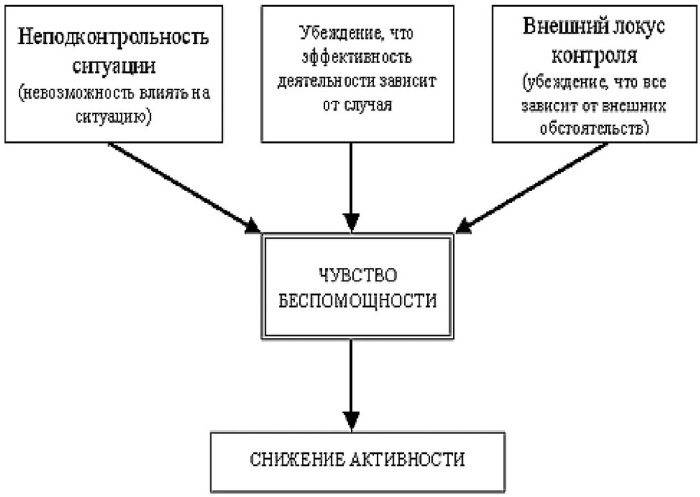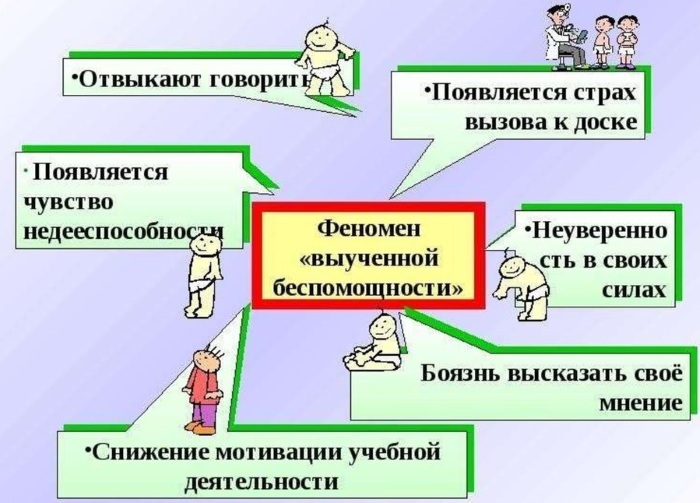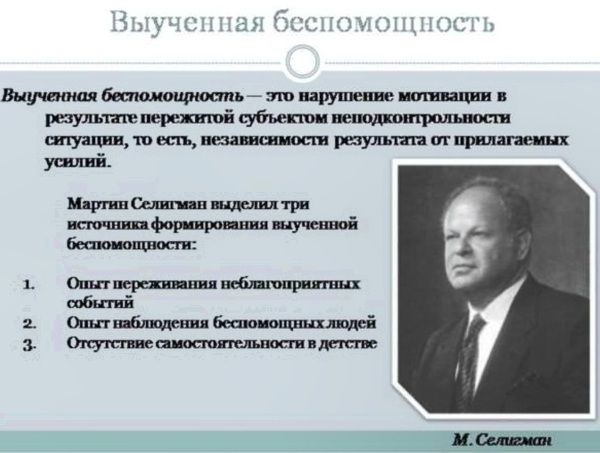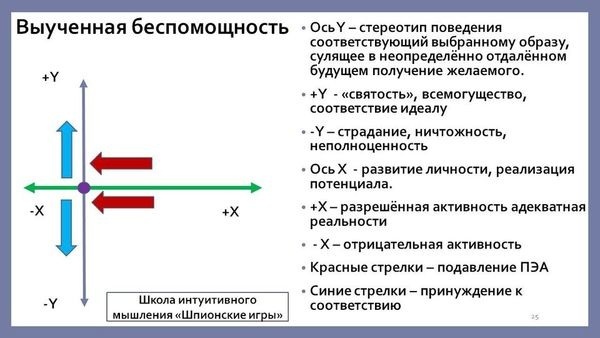Content
- What is learned helplessness syndrome in psychology?
- How learned helplessness arises
- In children
- In adults
- Causes of Learned Helplessness Syndrome
- Upbringing
- Mentality
- Constant failures
- Stereotypical way of thinking
- How does a person who has become a victim of the syndrome feel?
- Examples of the Impact of Learned Helplessness Syndrome
- Example No. 1
- Example No. 2
- Is it possible and how to deal with learned helplessness syndrome?
- Establishing a link between actions and consequences
- Failure is an integral part of life to be accepted.
- See life through the prism of optimism, not pessimism
- ABCDE method
- The authors of this method M. Selingman and A. Ellis. They propose to get rid of the syndrome according to the following scheme.
- Getting rid of post-traumatic stress disorder
- Keeping a progress diary
- What problems in life can learned helplessness lead to?
- Learned helplessness video
Sometimes it's hard for a person to change something in life. And there are several reasons for this, ranging from laziness to the fear of leaving your comfort zone. Learned helplessness is considered one of the reasons for the unwillingness to improve something, to learn to think more positively. Psychologists call it an important phenomenon, which is a basic human problem. Learned helplessness syndrome and methods of overcoming it are studied by many specialists who develop author's theories.
What is learned helplessness syndrome in psychology?
Learned helplessness is understood as the state of a person when he sees no reason to act further, to show any activity. Such an individual simply goes with the flow, he perceives the environment pessimistically. Often he does not want to change anything even when a real opportunity arises. And if he takes up the task, he quickly gives up, as he considers it very difficult.
People with this syndrome have no connection between their own efforts and the results they can get. A number of experts believe that this is not a syndrome, but a character trait that a person acquires after several unsuccessful attempts to change life for the better. After another failure, the individual has a strong conviction that he will never succeed, and he can only watch what is happening, whatever it may be.
When a person becomes a victim of the syndrome, he develops a strong belief that he is completely unable to control what is happening, cannot influence events. Therefore, he stops taking any active actions against what negatively affects the situation.
Learned helplessness and overcoming it are topical issues at any age. The syndrome can manifest itself in both children and the elderly. Most often, women face this phenomenon due to excessive impressionability, a tendency to worry about little things.
How learned helplessness arises
The psychologist Seligman developed the concept of learned helplessness syndrome.
In his opinion, there are 3 sources of its formation:
- adverse experience of experiencing certain events;
- lack of independence in childhood;
- watching a helpless person.
In children
The formation of learned helplessness in childhood often arises from trauma to the psyche. If a child often turns to adults for help, but is refused, he begins to believe that no one will ever help him, and there is no way to solve his problems. This state of mind can persist until full adulthood.
It is not uncommon for children who have experienced abuse at an early age to feel powerless.
In adults
Learned helplessness syndrome in adulthood occurs in people who often have to deal with stressful situations. There is nothing they can do to remedy the situation. Because of this, uncertainty begins to manifest. These can be natural phenomena that led to the loss of property, destruction of housing, dismissal from work, the death of a relative. In such situations, the individual often feels helpless, because of this, willpower is lost, self-esteem falls.
Even a fleeting encounter with difficulties affects how a person will behave further. For example, if a student sees very difficult questions at the very beginning of the test, he will solve the test as a whole much worse than in a situation where the easy tasks will come first. When faced with difficulty, students begin to doubt their abilities, and after that they make mistakes even in simple questions.
According to the psychologist D. Leontiev, learned helplessness can form the state itself in its citizens. The syndrome arises against the background of the general distribution of benefits. In such a situation, the individual will not correlate the quality of life with his efforts, so he will not try.
Causes of Learned Helplessness Syndrome
Learning helplessness and overcoming it is an important direction in psychology. This is not a congenital syndrome, but an acquired one. It is formed under the influence of certain reasons. The most common are:
Upbringing
This is the main and very first reason for the formation of the syndrome. Often the father and mother, educators and teachers themselves unconsciously push the child to this. Learned helplessness in children is manifested when the child cannot establish a connection between his actions and consequences.

Even encouragement, praise can play a negative role. If parents give the same praise both for their success in school and for cleaning the room, then the understanding of the connection between their efforts and the result gradually disappears.
Mentality
Learned helplessness is often influenced by mentality. This is typical for citizens who live in countries where their rights and actions are severely limited. Such people know that there is no point in going to court, no one will help them to prove their case. Gradually, a person ceases to believe in himself, he begins to think that the only way out is complete inaction.
Constant failures
Learned helplessness and overcoming it are studied by many psychologists. This is a condition that people who constantly experience setbacks have to deal with. If any action does not bring a result, then the person simply ceases to believe that he is able to change life situations. Such individuals cease to achieve goals, they do not set them before themselves at all. He will go with the flow, once again not show any initiative.
This is a condition that people who constantly experience setbacks have to deal with. If any action does not bring a result, then the person simply ceases to believe that he is able to change life situations. Such individuals cease to achieve goals, they do not set them before themselves at all. He will go with the flow, once again not show any initiative.
Stereotypical way of thinking
The quality of life of an individual deteriorates significantly if she lives according to outdated stereotypes. Templates imposed by someone prevent you from achieving your goals. If a person refuses to do something because it is not so accepted in society, he unwittingly becomes a victim of learned helplessness.
How does a person who has become a victim of the syndrome feel?
Based on Seligman's theory, learned helplessness syndrome in humans manifests itself as an acute deficit in emotional and cognitive abilities. A person constantly experiences a feeling of hopelessness, he has a depressed mood. This condition can trigger clinical depression.
Psychologists distinguish 2 types of deficiency:
- cognitive - it manifests itself in a lack of flexibility. The individual is incapable of comprehending that a small blunder is not a tragedy on a universal scale;
-
motivational - characterized by the absence of a skill that prompts the individual to perform active actions.

A person who has acquired helplessness syndrome becomes indifferent to everything around him, lethargic. He is constantly bothered by a sense of guilt. These are people with low self-esteem, they lack the desire for creativity, creativity. They look at everything around them through glasses of pessimism. A person believes that only he himself is to blame for all problems. Even success he perceives not as his own merits, but as a happy coincidence.
Examples of the Impact of Learned Helplessness Syndrome
Learned helplessness in life and ways to overcome it can be considered in specific situations.
Example No. 1
A boy is studying at school. He is diligent in his lessons, achieves great success, he is always set up as an example to the rest of the students. He loves to study very much, with great pleasure does his homework, takes part in various extracurricular activities. But the situation changes dramatically when a new teacher comes to school and begins to teach a subject completely unfamiliar to the hero of the story: geometry. The child does not understand her. He tries to find an approach to the teacher, asks to explain to him in addition.
But the teacher does not consider it necessary to devote too much time to the student. At the same time, he tells him that only children with good mental abilities can understand this subject. The boy begins to get depressed. He does not turn to his parents for help, as he believes that this is a shame.
He is afraid to show others that he is not able to master the subject, that he lacks abilities. Gradually, his interest not only in geometry, but also in other subjects, fades away. The boy starts skipping lessons, he gets in touch with bad company.
Example No. 2
Nikolay graduated with honors from the University of Economics. His goal is to find a high-paying, prestigious job. The young man succeeds in this. He makes a contract with a good company. And from that moment on, he begins to do everything possible to prove to the management that he is worthy of this position. But unsuccessful negotiations with one of the partners unsettled Nikolai.

From that moment on, he began to doubt his abilities, and a series of failures began. The young man even stopped paying due attention to the performance of his work duties. As a result, the situation reached the point that the leadership called Nikolai for a conversation. It was explained to him that the position entrusted to him requires more care and professionalism. Nikolai was fired, he began to drink, and no longer remembered his dream - to build a career.
Is it possible and how to deal with learned helplessness syndrome?
Learning helplessness and overcoming it is an important step for people facing the syndrome. There are several techniques for getting rid of it.
Establishing a link between actions and consequences
The person must realize that there is a connection between what he does and what he ends up with. You don't need to blame everything around you for failures, you need to find this very connection. Her search should be prompted not only by negative, but also positive actions. The task of a person is to understand that life is the result of a manifestation of activity. If you want to get a different result, then you need to act differently.
Failure is an integral part of life to be accepted.
Many people do not know how to adequately perceive failure. They accept them as a real tragedy. But in order to get rid of the syndrome of learned helplessness, you need to understand that failure always accompanies people throughout their lives.  If a failure occurs, this indicates that the person is acting, trying to achieve the goal. Nothing happens only for those who just go with the flow, are not engaged in self-development. Failure is a life experience. They teach you not to make mistakes in the future.
If a failure occurs, this indicates that the person is acting, trying to achieve the goal. Nothing happens only for those who just go with the flow, are not engaged in self-development. Failure is a life experience. They teach you not to make mistakes in the future.
See life through the prism of optimism, not pessimism
Psychologists say that pessimists are much more likely to suffer from learned helplessness syndrome. This is due to the fact that pessimists and optimists have different views of human actions and their causes. To learn to look at life optimistically, you need to completely change your lifestyle, thinking. The pessimist is accustomed to blaming only himself for all failures.
If something went wrong, he believes that he could not cope. An optimist, on the contrary, will look for objective reasons for what is happening. For example, he couldn't handle it because there wasn't enough time. To get rid of the syndrome, you need to stop calling yourself the cause of all problems and troubles. In any situation, you can find factors that affect the outcome of the situation from the outside.
ABCDE method
The authors of this method M. Selingman and A. Ellis. They propose to get rid of the syndrome according to the following scheme.
| BUT | In case of an unsuccessful outcome of the event, it is easy to state the facts. |
| IN | Express everything that a person thinks about this matter. For example, if he is late for an important meeting, you can explain that he got stuck in a traffic jam on public transport. |
| WITH | Describe all your emotions and feelings. A person should say how he feels about what happened. Whether he is worried about the feeling of guilt, shame. You can share this with your colleagues. |
| D | Conduct cognitive analysis. It will help you understand why the situation happened. Perhaps the person left late, did not take into account the likelihood of traffic jams. |
| E | Finally, you need to evaluate your feelings after analyzing the situation. Did the man himself understand that he was wrong, did he learn a lesson from this. |
If you deal with problems in this way, you can easily learn to think positively and get rid of the syndrome of learned helplessness.
Getting rid of post-traumatic stress disorder
Often, people lose confidence after being injured and temporarily inactive. Psychologists advise in such situations to do only what the possibilities allow. But at the same time, constantly take the initiative. For example, come up with a new hobby, learn how to cook a new dish.
It's important not to let negative emotions take over. The human brain has a negative characteristic. He often concentrates on bad memories. You need to remember the good as often as possible, to experience pleasant emotions over and over again.
Keeping a progress diary
To understand that a person is able to control his life, it is recommended to keep a diary of achievements. In it, you need to draw up a schedule, write an action plan, indicate goals. It is important to celebrate even the smallest achievements. This will help to raise self-esteem, self-confidence.
What problems in life can learned helplessness lead to?
To determine the consequences of learned helplessness syndrome, American psychologists Ellen Lunger and Judith Roden conducted an experiment in 1976 in a nursing home in Connecticut. The guests were divided into 2 groups. Some elderly people lived on the second floor. They were completely freed from any business. The rooms were cleaned by staff, the elderly were constantly looked after, surrounded by their care. Leisure was selected for them. And the inhabitants of the fourth floor did everything themselves.
As a result of the experiment, it was found that residents of the fourth floor began to feel much happier, and medical workers noticed that their health conditions improved. The study has proven that the ability to control the situation has a positive effect on both the physical and mental state of a person.
Among the problems that arise as a result of exposure to learned helplessness syndrome, psychologists distinguish:
- unhealthy pessimism - such people know how to assess the situation more realistic, but they are able to turn caution into a habit. Because of this, pessimists often retreat, leave things unfinished. Optimists in this situation will take persistence;
- lack of the ability to make decisions on their own, a person loses the ability to adjust their behavior to circumstances;
- the risk of depression increases - psychologists call learned helplessness one of the main causes of nervous breakdowns, severe depressive conditions;
- the occurrence of health problems - there is a close relationship between and the development of cancer.
Learned helplessness syndrome is a serious condition that can ruin a person's life, therefore, overcoming it is considered an important stage in psychology. Full personality development is possible only in the case of the ability to make independent decisions.
Learned helplessness video
How learned helplessness works:
